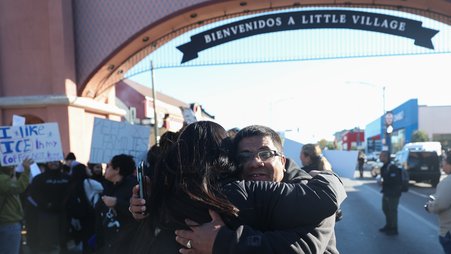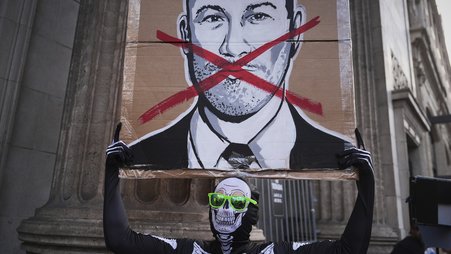Journalism is supposed to interfere with elections. Donald Trump once agreed. He was outraged when the media didn’t jump on the Hunter Biden laptop story that some think could have swung the 2020 election, and overjoyed that headlines about the FBI’s investigation into Hillary Clinton’s emails might have swung the 2016 one.
But now, he’s taken a break from fantasizing about mass shootings of journalists to theorize that reporting he perceives as unfair constitutes illegal “election interference.” He’s filed complaints against CBS News, claiming “60 Minutes” cleaned up a “word salad” answer by Vice President Kamala Harris to a question about the Israel-Gaza war. He’s also filed a complaint with the Federal Election Commission, characterizing the Washington Post’s coverage as an in-kind contribution to the Harris campaign.
Both cases are frivolous, but the CBS one is particularly concerning because two of Trump’s appointees to the Federal Communications Commission — Brendan Carr and Nathan Simington — are normalizing it (for the record, while news broadcasters are not barred from election interference, FCC commissioners are). This heightens fears over how a second Trump FCC could abuse its power.
Editorial judgment is for editors
We didn’t need “60 Minutes” to tell us that Harris’ position on the war — saddened by civilian casualties but noncommittal on doing anything about them — is incoherent, as is President Joe Biden’s (Trump’s position is clearer: He’ll proudly bankroll war crimes, minus the platitudes). It’s also true that CBS’ refusal to post a transcript or full video of the Harris interview online is odd — why not be transparent?
But, under the First Amendment, none of that is the FCC’s business — if CBS viewers don’t like the network’s coverage, they can change the channel, and if politicians think it’s unfair, they can take their case to the public.
It was the Reagan administration, not “woke” liberals, that repealed the unconstitutional “Fairness Doctrine.” That doctrine is even more ill-suited for today’s media landscape — with all of the outlets from which people get political news these days, the case for policing the public airwaves due to “scarcity” is even less compelling than it was decades ago.
Absent the Fairness Doctrine, Trump and his allies are citing the FCC’s “news distortion policy.” But as the agency’s own description of that policy acknowledges, “The FCC is prohibited by law from engaging in censorship or infringing on First Amendment rights of the press,” including “a broadcaster's selection and presentation of news or commentary.”
The FCC has stated it will only intervene when there is strong evidence of “intentional falsification.” Carr himself gave the example of splicing different answers to change a “yes” to a “no.” Editing a rambling answer can hardly be called “intentional falsification.” In both versions, Harris claimed the Biden administration has, or will, do something or other to rein Israel in and end the war, without specifying what. Her substantive position (or lack thereof) came through loud and clear.
That being said, it’s not hard to imagine the distortion policy, and other exploitable ambiguities in the commission’s authority, being weaponized by a politicized FCC (same for the FEC, for that matter, although thankfully no FEC commissioner has credited the absurd notion that favorable coverage is a campaign contribution).
If so, the backstop will be the same courts that lately often carry Trump’s water. That’s not particularly comforting. On the bright side, one of the right’s proudest recent judicial achievements -– the abolishment of the “Chevron deference,” which required courts to defer to administrative agencies — could, ironically, make it easier for judges to check an out-of-control Trump FCC.
All censorship is local
Calls for the FCC to overstep have not only come from the MAGA universe. In 2020, the FCC rejected a petition to apply its “hoax” rule against networks that aired Trump’s false statements about COVID-19. The commission said it “will not second-guess broadcasters. … We leave to the press its time-honored and constitutionally protected role in testing the claims made by our political leaders.”
And a former Democratic FCC commissioner joined efforts to revoke a broadcast license of a local Fox affiliate to punish Fox News for broadcasting Trump’s lies about the 2020 election. Trump has called for revocation of broadcast licenses associated with every major network, drawing condemnation from FCC Chair Jessica Rosenworcel. Trump’s supporters already cite his opponents’ revocation demands to legitimize his own.
And the impact of Trump’s unconstitutional antics has trickled down to the local level. Florida Gov. Ron DeSantis threatened to prosecute broadcasters for airing abortion rights ads. A political candidate in Ohio sued a newspaper for allegedly being less critical of his opponent than him. Expect more of that if supposed experts like Carr and Simington keep bolstering Trump’s nonsense.
Regardless of the election outcome, lawmakers and the FCC should do everything in their power to safeguard the agency from politicization and remove any wiggle room that could be abused, whether it’s the distortion rule, the hoax rule, or any others. This should have happened long ago — it’s not as if there weren’t enough warning signs. But better late than never.





